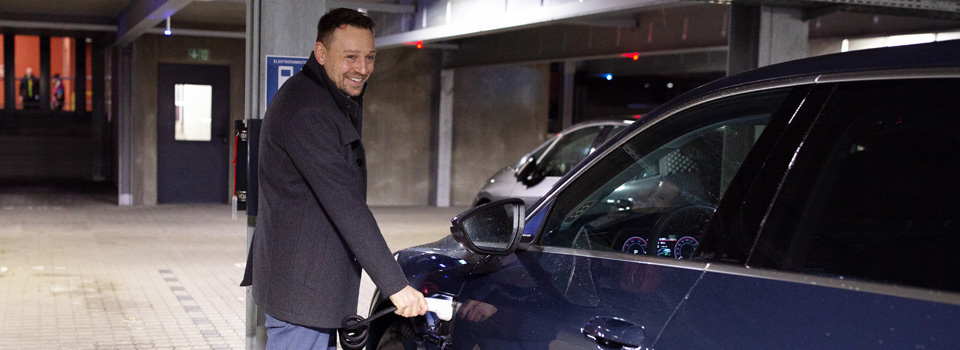An electrifying future – E-mobility and the corporate vehicle fleet.
There is huge potential in German companies to make their fleet more environmentally friendly. Two-thirds of all newly registered cars in Germany are company vehicles that drive twice as many kilometres as personal cars, but Bechtle is not holding back when it comes to e-mobility. Find out how Bechtle is smoothing the way to e-mobility in its vehicle fleet.
Written by
“Part of our business model is to make it a priority to be close to our customers and often times, there is no alternative but to be physically on-site to carry out work. With this in mind, we’ve set our sights on expanding our e-mobility offering to minimise our emissions,” says Dirk Moritz of the Fleet Management Team at Bechtle Mobility GmbH. It is essential for Bechtle customer account managers, consultants and service technicians to be mobile to support their customers on-site, which is why the German vehicle fleet of some 4,300 cars makes up a significant proportion of Bechtle’s carbon emissions.
“Comparatively speaking, we measure up quite well, but there is still a lot of room for improvement,” says Dirk Moritz. In Germany, 29.9 per cent of Bechtle’s vehicle fleet are currently hybrid and 11.5 per cent fully electric, putting it well above the German average of five per cent fully electric vehicles in larger businesses according to the latest KfW Climate Barometer. With hybrid vehicles included, that average goes up to 14 per cent. At Bechtle, the figure is 41.4 per cent.
We’ve set our sights on expanding our e-mobility offering to minimise our emissions.
Dirk Moritz, Fleet Management, Bechtle Mobility GmbH
Electric vehicles for more relaxed driving.
There are multiple reasons why e-mobility hasn’t really caught on at enterprise level, including short ranges, limited charging infrastructure and even a lack of experience to name but a few cited in the recently published Handelsblatt Research Institute study.
Manuel Liesenfeld, Head of the Public Sector Division at Bechtle has heard all of these before. As a driver of an electric vehicle, he often travels long distances, even to Bechtle sites in France and Belgium. “It works fine,” he says continuing, “it’s a great driving experience. It’s so quiet and the acceleration is sensational—it's like you’re flying”.

The switch from hybrid to fully electric didn’t go entirely smoothly however. “It took around two months before I’d experienced every possible eventuality. I rolled up my sleeves, found solutions and now it’s simply part of my routine,” explains Manuel Liesenfeld. Would he go back to standard combustion engine? Never. His car’s realistic range is around 350 kilometres. “I’ve adapted the way I drive to be more economical and take breaks where there are fast-charging stations—and they really do charge very quickly—which has the effect that I arrive at my destination much more relaxed than before,” he reports.
He is one of 492 Bechtle colleagues driving electric vehicles and in 2023 alone, 327 fully electric vehicles were added to the fleet in Germany. With an ever-increasing number of employees, the total number of vehicles required will go up, which is another reason to promote e-mobility.
|
Year (as of 31/12) |
Total no. of vehicles (Germany) |
Total no. running on alternative fuels |
Of which fully electric |
|
2020 |
3543 |
610 |
57 |
|
2021 |
3551 |
946 |
72 |
|
2022 |
3999 |
1466 |
164 |
|
2023 |
4285 |
1773 |
492 |
41.4%
Proportion of hybrid or fully-electric Bechtle company vehicles. (As of 31/12/2023)
Sufficient charging opportunities and the use of green energy are both critical factors for success. “Charging needs to be made as easy as possible, which is why we’ve continued to increase the number of charging points at our sites so that our employees can plug in while they are work,” says Dirk Moritz. By the end of 2023, there were a total of 733 charging points at the 51 Bechtle sites in Germany, Austria and Switzerland—a year-on-year increase of 369. At the headquarters in Neckarsulm alone, there are 166 charging stations powered by solar panels installed on the roof of the multi-storey car park.
Hybrid vehicles bridging the gap.
Helge Höhn, Head of Professional Services at Bechtle Mannheim is also a convert to environmentally friendly vehicles. “Electric vehicles are so much more fun than those with combustion engines.” Even the tech like the infotainment systems is better. He drives around 3,500 kilometres a month and is proud to be doing his bit for the environment. “I’ve not changed the way I drive, just organised myself differently. The car is charged when it’s parked at the supermarket, at home or at the office.” He smiles when he thinks back to his first long-distance drive. “I was definitely a little nervous,” he admits, “but in my experience, the fears people have about these vehicles’ range are completely unfounded.” All he has to do is find a fast charger, take a quick coffee break, check his e-mails and away he goes again.
In my experience, the fears people have about these vehicles’ range are completely unfounded.
Helge Höhn, Head of Professional Services, Bechtle Mannheim
The number of kilometres driven by fully-electric vehicles increased from 383,108 in 2021 to 5.2 million in 2023. The Bechtle fleet still includes a number of hybrid vehicles. “We see hybrid vehicles as bridging the gap towards acceptance, smoothing the way towards e-mobility and we’ve seen that our colleagues are then more easily able to make the switch to electric vehicles,” explains Dirk Moritz. Manuel Liesenfeld also first drove a hybrid vehicle before switching to fully electric. “It really bothered me to be driving around quietly and then all of a sudden the diesel engine would kick in. I wanted to get away from that.”
